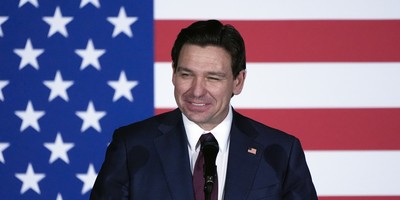The recent political entanglements over the budget have focused more on political maneuverings and who is right about what statement, rather than what the policies mean to average, everyday Americans.
It might be standard politics, but it does not create the right framework. The right framework includes thinking about the impact to everyday Americans and to future generations of Americans. When our founders fought for freedom, they did so for future Americans as well as themselves.
Our nation has long led the world's fights for freedoms -- freedom of religion, freedom of speech, freedom to bear arms. Our founding document, the Declaration of Independence, laid out that we were free from the rule of monarchs and created a new form of government that, while frustrating, ensured that there would be no dictator.
This support for freedom has extended to other nations at times in our history, with varying results. Sixty years ago, President John F. Kennedy uttered the words "Ich bin ein Berliner" at the Brandenburg Gate in Berlin. This speech solidified our support for those in West Berlin and put the Soviet Union on notice that we would not turn our backs on the world.
U.S. foreign policy changed five months later, after Kennedy's assassination. The next four presidents maintained a period of detente. After Vietnam, the Carter administration pulled back U.S. forces from across the globe, while the Soviet Union became more aggressive. In 1979, the Soviets invaded Afghanistan.
Ronald Reagan's presidential win in 1980 led to a very different foreign policy, one based on strength rather than weakness. Reagan believed that Soviet communism could be and had to be defeated.
Recommended
Forty years ago, Reagan delivered his "evil empire" speech to the annual convention of the National Association of Evangelicals, in Orlando, Fla. "Freedom prospers when religion is vibrant and the rule of law under God is acknowledged," was Reagan's moral argument.
He transformed the crisis to one of spiritual and moral faith rather than one of military strength. "The real crisis we face today is a spiritual one; at root, it is a test of moral will and faith," he said.
Not content simply to define the crisis, Reagan also clearly defined our enemy at the time. "Let us be aware that while they preach the supremacy of the state, declare its omnipotence over individual man and predict its eventual domination of all peoples on the earth, they are the focus of evil in the modern world," he said.
Two weeks later, Reagan confronted our enemy by announcing the Strategic Defense Initiative, a program to build a space-based anti-missile system. While many did not believe that the technology existed to make this system operational, the idea put the Soviets on notice that Reagan was serious and would not back down easily.
When Reagan spoke in Berlin in 1987, he lay down a challenge to the Soviet leader: "General Secretary Gorbachev, if you seek peace, if you seek prosperity for the Soviet Union and Eastern Europe, if you seek liberalization: Come here to this gate! Mr. Gorbachev, open this gate. Mr. Gorbachev, tear down this wall."
As we think about our own legacy, we have to remember that it is important to transform and correctly frame the crisis of our time, based not solely on what it means to us materially, but also on what it will mean to future generations. The debt and deficit crisis is not simply an argument about economics, it's also an argument about morality and freedom. Debt takes freedom from future generations and ties them to a debt that they did not create.
Focusing on the task at hand trivializes the argument and blurs the lines between one side and the other.
Articulation of large, clear goals -- like those cited by Reagan -- is needed to win the argument and then to win the vote.
"Freedom leads to prosperity," Reagan declared that day in Berlin. "Freedom replaces the ancient hatreds among the nations with comity and peace. Freedom is the victor."
To become victorious, we must replace hatred with comity and peace and focus on freedom, what it means to everyday Americans today and what it means for future generations to be free and to clearly articulate a better future for all Americans.
























Join the conversation as a VIP Member